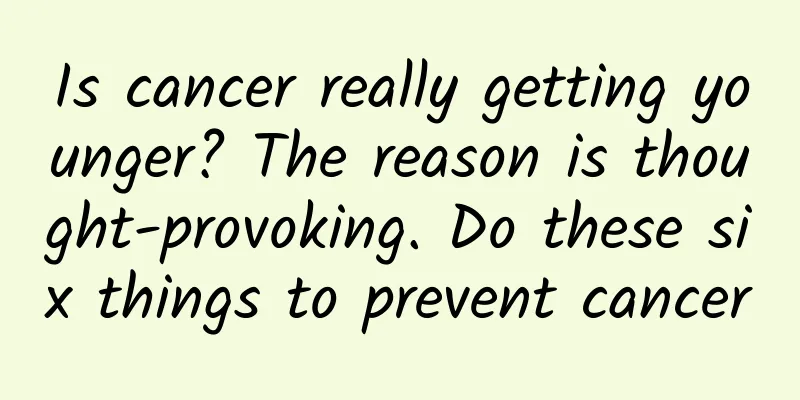Is cancer really getting younger? The reason is thought-provoking. Do these six things to prevent cancer

|
In October, Wu Jie, a senior host of Chongqing TV Station, died of cancer at the age of 44. Huo Jiujiu, who had 180,000 fans in September, died of lung cancer. He was diagnosed with advanced lung cancer during the Spring Festival of 2020, just three months after his marriage. Another patient, Ajian, who died of rectal cancer in September, was also in his early thirties. Fu Biao, liver cancer, 42 years old; Anita Mui, cervical cancer, 40 years old; Yao Beina, breast cancer, 33 years old; Luo Jing, died of lymphoma in 2009 at the age of 48; Wang Huan died of cancer in 2013 at the age of 42; Fang Jing, died of stomach cancer in 2015 at the age of 44; Xiao Xiaolin, died of rectal cancer in 2017, aged 55 Li Yong died of cancer in 2018 at the age of 50... Is cancer getting younger? 1. What is the reason why the age of cancer incidence is getting lower and lower? In people's general perception, most people suffering from cancer are elderly people, and youth is always associated with health. The most typical examples are breast cancer and colorectal cancer, two cancers that are closely related to modern lifestyles. Not only is the number of cases increasing, but the age of onset is also getting younger and younger. The reason why everyone feels that there are young cancer patients everywhere is not only closely related to the dissemination of information, but there are also some reasons that lead to the age of cancer incidence getting lower and lower. 1. Environmental factors The reason why there are more and more cancer patients is related to environmental pollution. With the progress of industrialization and urbanization, environmental pollution is everywhere. From air pollution to radiation pollution, toxic and harmful substances are flooding our lives and affecting the physical health of contemporary people. 2. Lifestyle 1) Contemporary young people often work overtime, stay up late, have irregular work and rest schedules, and are prone to excessive fatigue, which leads to a long-term sub-health state. In addition, the high pressure at work and in life makes the mind in a state of anxiety for a long time, and even insomnia and depression. These combined factors may lead to a decline in the body's immunity. 2) Young people generally like to eat all kinds of strong-tasting foods, such as smoked, grilled, and fried foods, and foods rich in oil, fat, salt, and sugar. Fat is most strongly associated with cancer, especially breast cancer, colorectal cancer, and prostate cancer. For example, the younger age of colorectal cancer is closely related to genetic factors and lifestyle and eating habits (such as sitting for long periods of time, eating too few vegetables, eating too much processed meat, smoking, drinking, etc.). There are more than 600 harmful substances in smoke, of which more than 40 are carcinogenic. Compared with non-smokers, smokers have a much higher risk of developing lung cancer, laryngeal cancer, esophageal cancer, and bladder cancer. Unhealthy diet is also a major risk factor for cancer. For example, the occurrence of gastric cancer is related to a high-salt diet and a love of smoked foods; The occurrence of liver cancer is related to eating moldy food and drinking alcohol for a long time; The occurrence of esophageal cancer is related to eating hot food, eating moldy food, and drinking a lot of strong alcohol for a long time; The occurrence of colorectal cancer is related to eating a diet high in animal fat, animal protein, and a low-fiber diet. 3) Lack of exercise and obesity can also increase the risk of cancer. Obesity can change the hormone levels in the body and increase the risk of esophageal cancer, gallbladder cancer, pancreatic cancer, colorectal cancer, uterine cancer, ovarian cancer, kidney cancer and breast cancer. 3. The awareness of physical examination is not as good as that of middle-aged and elderly people Many young people have little awareness of physical examinations. Relying on their strong bodies, they try to endure minor health problems. They often miss the earliest signs of disease and the best period for treatment. By the time they discover the problem, it is too late. 4. Lack of awareness of early cancer screening People at high risk of cancer should undergo physical examinations to ensure early detection and treatment. 1) Among the lung cancers detected by low-dose spiral CT, early-stage lung cancer accounts for more than 80%. The expected 10-year survival rate of patients who undergo timely surgery can reach 88%, which can reduce the lung cancer mortality rate by 20%. 2) Studies have found that first-degree relatives of people diagnosed with early-onset colorectal cancer are 6 times more likely to be diagnosed with colorectal cancer before the age of 50, while second-degree relatives are 3 times more likely and third-degree relatives are 1.56 times more likely. If you have a colonoscopy regularly, the prognosis will be much better. 3) For gastric cancer, non-invasive diagnostic methods are used to screen out people at high risk of gastric cancer, and then targeted endoscopic examinations are performed. Endoscopy and endoscopic biopsy are currently the gold standard for diagnosing gastric cancer, especially for flat and non-ulcer gastric cancer, with a higher detection rate than X-ray barium meal and other methods. 4) The symptoms of early liver cancer are not obvious. If liver cancer is discovered after symptoms appear, it is often in the late stage! For patients with a history of hepatitis B, liver cirrhosis, or liver cancer in the family: it is recommended to have an abdominal B-ultrasound examination + serum alpha-fetoprotein (AFP) examination every 6 months; if you are over 40 years old and love to drink: it is recommended to have a physical examination once a year. 5) In addition to self-examination, the currently recommended methods for breast cancer are mainly mammography (X-ray) and B-ultrasound, and magnetic resonance imaging is used for high-risk groups. The Chinese Anti-Cancer Association's Breast Cancer Diagnosis and Treatment Guidelines and Norms specifically emphasize the recommendation of mammography and B-ultrasound examination for dense breasts. 6) The cervical cancer screening program recommends ultra-thin liquid-based cytology test (TCT) + HPV test. Therefore, there are many factors that contribute to the increasingly younger age of cancer, including genetics, environment, diet, etc. 2. How can young people prevent cancer? The younger age of cancer is related to the 996 work schedule. The International Agency for Research on Cancer (IARC), a subsidiary of the World Health Organization, has listed night shift work as a "possible carcinogenic factor" based on a follow-up survey of nurses and flight attendants who often have to work night shifts. Poor sleep may become an "accomplice" of cancer. Regulating sleep can prevent a decline in immunity. 1. Please don't stay up late. Do the big things tomorrow. 2. Eat on time! Eat fresh and healthy food, eat less and drink less, increase the intake of high-fiber food, and reduce the intake of processed meat; 3. Maintain a healthy weight. WHO recommends that every adult should exercise actively every day, at least 150 minutes of moderate-intensity aerobic exercise or at least 75 minutes of vigorous aerobic exercise per week. So take half an hour to exercise every day! Even running is fine, but avoid excessive sun exposure; 4. Do not smoke, drink alcohol, or eat betel nuts. Drink more boiled water and less sugary drinks. 5. Be open-minded, don't get angry easily, take a step back and you will have a broader horizon; 6. Control viral infections such as HPV and Helicobacter pylori. Human papillomavirus (HPV) and Helicobacter pylori (H.pylori) infections are important risk factors for cervical cancer and gastric cancer, respectively. In addition, Epstein-Barr virus and hepatitis B virus (HBV) are also related to the occurrence of cancer; 6. Regular physical examinations are very important. Any minor health problems should be dealt with promptly. People at high risk of cancer should undergo preventive measures such as cancer screening. |
>>: How to choose rose tea? When is the best time to drink rose tea?
Recommend
Can low progesterone cause miscarriage?
We all know that there is a certain relationship ...
How to win a man's heart
We know that men are all fickle, but women can st...
Why does lipstick peel off after applying it?
Lipstick is a must-have item for almost all women...
Give asthma patients a "desensitized" home
The onset of asthma is closely related to environ...
What are the lumps on the breasts?
The lumps on the breasts may be caused by lymph n...
What skin care products are good for pregnant women with spots
Women will develop various dark spots during preg...
Are larger carotid artery plaques more dangerous and smaller ones safer?
Some patients are found to have carotid artery pl...
What is a women's ring?
Many of our friends may have heard the term "...
White particles on the girl's scalp
There are white particles on the girl's scalp...
I had abdominal pain on the third day after the transplant.
As IVF technology matures, more and more couples ...
Causes of elevated D-dimer levels during pregnancy
D-dimer is a routine test during prenatal check-u...
What should I prepare for traveling to Sanya? What are the popular attractions in Sanya?
As a student, vacations are very precious. If you...
What are the manifestations and treatments of miscarriage caused by partial uterine septate?
Some women have irregular menstruation and often ...
What to do if cracks appear on the wall after one year of renovation? Method of applying latex paint on putty wall
The paint in my home has cracked after one year o...
I haven't had my period for half a year and my belly is big and hard
For some careful girls, if their menstruation is ...
![[Fat Bear Popular Science] Pay attention! There are still so many friends asking about radiotherapy. I will sort it out again today. Don’t blame Fat Bear for not talking about it...](/upload/images/67f1eb654c0fc.webp)








